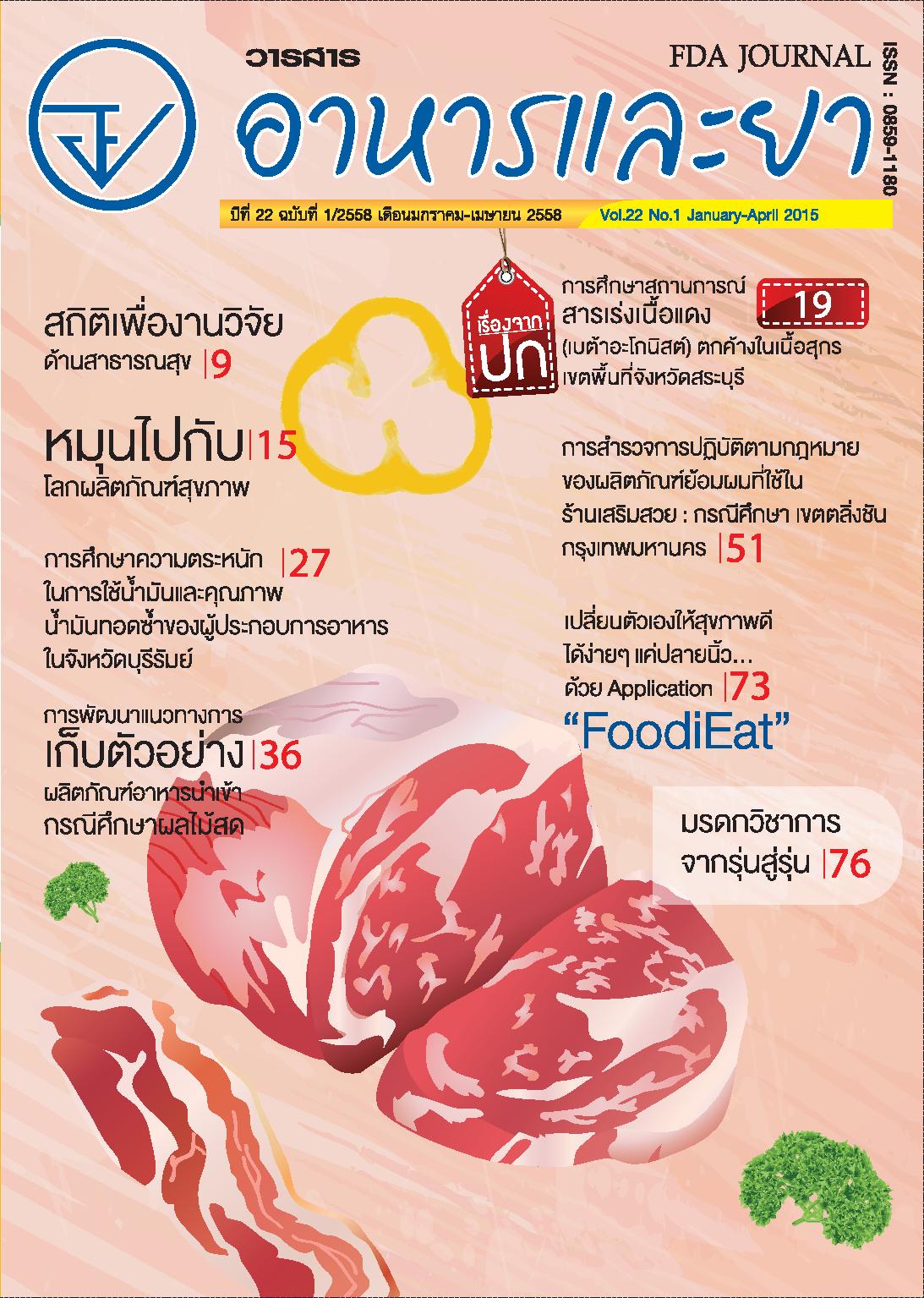การศึกษาสถานการณ์สารเร่งเนื้อแดง (เบต้าอะโกนิสต์) ตกค้างในเนื้อสุกร เขตพื้นที่จังหวัดสระบุรี
Main Article Content
บทคัดย่อ
ปัจจุบันพบว่า มีการลักลอบใช้สารเร่งเนื้อแดง หรือสารเคมีกลุ่มเบต้าอะโกนิสต์ ในหมู วัว และ สัตว์ปีก
ได้แก่ เคลนบูเทอรอล และซัลบูทามอล ซึ่งมีผลข้างเคียงคือ ทำ ให้ชั้นไขมันลดลง และเพิ่มปริมาณกล้ามเนื้อ
หรือเนื้อแดง การศึกษาครั้งนี้มีวัตถุประสงค์เพื่อศึกษาและเฝ้าระวังสถานการณ์สารเร่งเนื้อแดง (เบต้าอะโกนิสต์)
ตกค้างในเนื้อสุกรที่จำ หน่าย และกำ หนดแนวทางการแก้ปัญหาการปนเปื้อนสารเร่งเนื้อแดง (เบต้าอะโกนิสต์)
ในเนื้อสุกร เขตพื้นที่จังหวัดสระบุรี โดยเก็บตัวอย่างเนื้อสุกรที่จำ หน่ายในเขตพื้นที่ 13 อำ เภอ ของจังหวัด
สระบุรี ทั้งตลาดสด ตลาดนัด และร้านจำ หน่ายอาหาร ตรวจวิเคราะห์หาสารเร่งเนื้อแดงตกค้าง ได้แก่
สารซัลบูทามอลและเคลนบูเทอรอล โดยใช้ชุดตรวจสอบหาสารเร่งเนื้อแดงตกค้างแบบเร็ว ที่ใช้หลักการ
อิมมูโนโครมาโตกราฟฟี ซึ่งเก็บตัวอย่างเนื้อสุกร จำ นวน 125 ตัวอย่าง พบสารเร่งเนื้อแดงชนิดซัลบูทามอลตกค้าง
จำ นวน 2 ตัวอย่าง คิดเป็นร้อยละ 1.60 จำ แนกตามสถานที่พบการปนเปื้อน ได้แก่ ตลาดสดประเภทที่ 1 และ
ตลาดสดประเภทที่ 3 (ตลาดนัด) ประเภทละ 1 ตัวอย่าง แต่ไม่พบสารเร่งเนื้อแดงในตัวอย่างเนื้อสุกรที่เก็บจาก
ร้านอาหาร เมื่อเปรียบเทียบกับผลการตรวจสารเร่งเนื้อแดงในปัสสาวะสุกรที่เก็บตัวอย่างจากฟาร์มเลี้ยงสุกร
ในเขตพื้นที่จังหวัดสระบุรี จำ นวน 547 ตัวอย่าง พบให้ผลบวกจำ นวน 4 ตัวอย่าง คิดเป็นร้อยละ 0.7
แสดงให้เห็นว่า ในปัจจุบันแม้ว่ารัฐจะมีการดำ เนินหลายมาตรการเพื่อป้องกันไม่ให้เกษตรกรใช้สารเร่งเนื้อแดง
แต่ก็ยังพบว่ามีการลักลอบใช้สารเร่งเนื้อแดงในการเลี้ยงสุกร ซึ่งเกษตรกรไม่ตระหนักถึงอันตรายของสารเร่ง-
เนื้อแดงที่จะส่งผลกระทบต่อผู้บริโภค และยังมีข้อจำ กัดของภาครัฐในการตรวจเฝ้าระวังสารเร่งเนื้อแดง
ตกค้าง ที่ประเทศไทยยังไม่มีผู้ผลิตชุดทดสอบสารเร่งเนื้อแดงตกค้างในเนื้อสุกร ต้องนำ ส่งเข้ามาจาก
ต่างประเทศทำ ให้ชุดทดสอบมีราคาค่อนข้างสูง ในส่วนกฎหมายที่บังคับใช้มีบทกำ หนดโทษไม่เหมาะกับ
สถานการณ์ปัจจุบัน ควรมีการแก้ไขบทกำ หนดโทษให้สูงขึ้น และประสานกับกรมวิทยาศาสตร์การแพทย์
เพื่อพัฒนาชุดทดสอบที่สามารถตรวจหาสารเร่งเนื้อแดงเพื่อเป็นการคัดกรองที่มีประสิทธิภาพ และลดค่าใช้จ่าย
ในการส่งตรวจวิเคราะห์ทางห้องปฏิบัติการ (LC-MS/MS)


